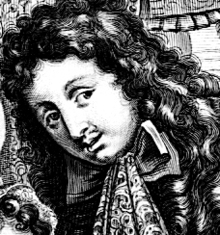Actéon (opera)
Actéon (Actaeon) is a Pastorale in the form of a miniature tragédie en musique in six scenes by Marc-Antoine Charpentier, Opus H.481 & H.481a, based on a Greek myth.
| Actéon | |
|---|---|
| Opera by Marc-Antoine Charpentier | |
 Marc-Antoine Charpentier in 1682 | |
| Language | French |
| Based on | Ovid's Metamorphoses |
History
It is highly unlikely that this opera was written for performance at the Hôtel de Guise, the palatial Parisian residence of Marie de Lorraine, Duchess of Guise, Charpentier's protectress. (The work was copied into a Roman-number notebook, which strongly suggests that it was an outside commission; and the overall distribution of voices and instruments does not match that of the Guise ensemble of the time.) Although the patron and the place of performance remain unknown, the date can be determined with considerable accuracy: the spring hunting season of 1684. Later that year (presumably for the fall hunting season) it was revised to change the title role from an haute-contre role (perhaps originally sung by Charpentier)[1] to a soprano part, and was at that time renamed Actéon changé en biche.[2]
The author of the French libretto is unknown, however the plot is based on a story in Ovid's Metamorphoses. In this story the hunter Actaeon (Actéon in French) accidentally discovers the goddess Diana (Diane in French) bathing with her attendants. He tries to hide himself, but is discovered, and Diane in anger turns him into a stag, and he is pursued and torn apart by his own hounds.
This story is the same one recounted in the aria "Oft she visits this lone mountain" from Purcell's Dido and Aeneas, first performed in 1689.
In 2015, Ayrshire Opera, led by David Douglas translated the opera into Scots and performed it as part of a community project.
Roles

| Role | Voice type | Premiere Cast, 1683-5 (Conductor: – ) |
|---|---|---|
| Actéon, a hunter | haute-contre | Charpentier (?) [3] |
| Diane, Goddess of the hunt | soprano | Jacqueline-Geneviève de Brion[4] |
| Junon, Queen of the gods | mezzo-soprano | |
| Hyale | mezzo-soprano | |
| Aréthuze | soprano | |
| Daphné | soprano |
Selected recordings
- conducted by William Christie, Les Arts Florissants CD. Harmonia Mundi Musique d'Abord (1982). Catalog# 1951095.
- conducted by Paul O'Dette and Stephen Stubbs, Boston Early Music Festival CD. cpo (2009). Catalog# 777 613–2.
References
- John S. Powell. "Actéon", Grove Music Online, ed. L. Macy (accessed July 23, 2006), grovemusic.com Archived 2008-05-16 at the Wayback Machine (subscription access).
- H. Wiley Hitchcock. "Charpentier, Marc-Antoine 3. Stage music.", Grove Music Online, ed. L. Macy (accessed July 23, 2006), grovemusic.com Archived 2008-05-16 at the Wayback Machine (subscription access).
- Hitchcock
- This is, of course, a pun, because a female singer (a biche, a "doe") has taken the place of the original male who was turned into a stag.
- The composer is very likely to have performed the title role in this opera; cf. Catherine Cessac, "Les Arts Florissants – Actéon", in Philidor/CMVB, p. 173-74 Archived 2011-07-20 at the Wayback Machine (accessed 6 August 2010)
- Catherine Cessac, "Les Arts Florissants – Actéon", in Philidor/CMVB, p. 173 Archived 2011-07-20 at the Wayback Machine (accessed 6 August 2010)
External links
- Libretto (in French)